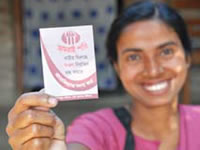Amrai Pari Paribarik Nirjaton Protirodh Jot (WE CAN)
STORY

A victim of dowry-related violence in a patriarchal society
A poor farmer's daughter, Kamrun was married off at 16. Her father failed to give her husband the dowry he had promised. And then began the inhuman torture. When the torture got too much for her to bear and she tried to run away back to her father's family, they not only refused to give her shelter but beat her and sent her unconscious body on a riskshaw van to her in-laws in the next village, where they said she now âbelongsâ, dead or alive. And, her life continued as one of torture and abuseâ¦
Kamrun represents many young women in this subcontinent, who become victims of the worst case of dowry practice.
But the difference is that Kamrun got lucky: she had the courage to fight back and not only survive but turn her fate around. Fortunately, her mother and brother helped her get a divorce. It was not easy: all three had to run away to the nearest town to get legal aid and her brother and mother had to hide with her for months, with very little money⦠before the divorce was final.
Burns, bruises and cut mark on her body provided Kamrun with ample proof for her to win the case at court, but they could never return to their own village. Even in the 21th century, they were seen as transgressors by their people. They have paid a high price, forced to become outcasts.
But then, her journey into a better life began in 2005. Polli Sri, a partner organisation of 'We Can', approached Kamrun and she joined the campaign.This once destitute young woman not only received a loan to start vegetable cultivation and buy goats and cows; in addition, Kamrun educated herself on violence against women issues and she found a voice to take a strong stand against it.
Today, Kamrun is the most successful Change Maker in her community because she herself had endured violence and came out as a survivor.
Karmun is now not only a successful Change Maker who has changed her own life (she owns a number of goats and cows, has savings in her bank, offers financial support to her sister's family with whom she still lives). She now helps other women of her village to fight back domestic violence. Also, she has established herself as the most respected and progressive woman of her village who is invited to programmes organised by government officials like the TNO (important government official at Thana level ) to give âtalksâ to an audience who shower her with respect and awe.
Her eyes still reflect the horror and inhuman suffering she had been through. She still holds a grudge against the male dominion of her society. But Kamrun, the survivor, draws quiet satisfaction from being able to help other women find their way forward to a better fairer world. Kamrun, a leader in her community, is now seen showing other women how to fight back the evils of a patriarchal society, how to live a life free of abuse and violence and find a respectable place in society.
About Us
Amrai Pari Paribarik Nirjaton Protirodh Jot (WE CAN) is a collective platform of civil society, organizations, individuals, institutions and others aim of ending violence against women.
Keep In Touch
Amrai Pari (WE CAN) Secretariat
6/4 A, Sir Sayed Road (2nd Floor)
Mohammadpur, Dhaka-1207 Bangladesh
Tel: +88 02 41023217
E-mail: [email protected]
Web: www.wecan-bd.org
Copyright © 2018 All Rights Reserved By We Can Bangladesh
About Us
Amrai Pari Paribarik Nirjaton protirodh Jot (WE CAN) is a collective platform of civil society, organizations, individuals, institutions and others aim of ending violence against women.
Keep In Touch
Amrai Pari (WE CAN) Secretariat
6/4 A, Sir Sayed Road (2nd Floor)
Mohammadpur, Dhaka-1207 Bangladesh
Tel: +88 02 41023217
E-mail: [email protected]
Web: www.wecan-bd.org
Copyright © 2018 All Rights Reserved By We Can Bangladesh
